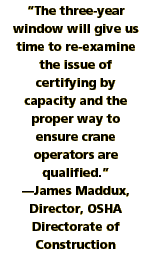May 24, 2013 - The Occupational Safety and Health Administration (OSHA) has announced plans to extend the compliance date for its crane operator certification requirement to November 10, 2017, in order to revisit the record on operator certification.

The additional three years would, OSHA says, provide time to partially re-open the crane rule to address industry concerns over the “certifying by capacity” requirement and whether certification is equivalent to qualification.
“The three-year window will give us time to re-examine the issue of certifying by capacity and the proper way to ensure crane operators are qualified,” said Director of OSHA’s Directorate of Construction, Jim Maddux at a meeting of the Advisory Committee on Construction Safety and Health (ACCSH) in Washington, DC, May 23, 2013. He indicated that OSHA had put a team in place which had been tasked with ensuring that “we have a good crane standard to ensure crane safety.”
Maddux said the agency had “an open mind” and that it would be re-examining the issues in contention “thoroughly.” As for a timeline on the proposed rule that is the second phase of this initiative, Maddux would only say that this was “high on the priority list” and that the agency would “step out smartly and do things in a reasonable timeframe.”
Certifications were increasingly part of what employers use, Maddux said, and he hoped that they would continue to do “all they can to ensure their crane operators were appropriately qualified.”
In testimony before the NCCCO Executive Director Graham Brent welcomed OSHA's stated intention to partially reopen the crane rule. Since this rulemaking would require additional time, Brent stated that NCCCO supported OSHA's decision to postpone the effective date of the operator certification requirements, albeit reluctantly.
"Although it is regrettable that it has taken OSHA so long to recognize that the industry has serious problems with the agency's stance on issues such as certifying by capacity and the meaning of certification, it is a vindication of the efforts of concerned industry stakeholders over the past 18 months to raise awareness on these matters that OSHA has, finally, taken notice."
However Brent noted that time was of the essence. "We strongly urge OSHA to pursue the second phase of this initiative—the development of proposed rulemaking—with all haste," he said. "An extension of the deadline, already unpopular with many sectors of industry—is worthless without immediate and substantive action to solicit industry comments that will result in a resolution accurately reflecting the intent of the industry group—C-DAC—that OSHA itself assembled to develop this rule."
Members of the original committee established by OSHA--the Cranes and Derricks Advisory Committee or C-DAC committee--have repeatedly said it was not their intent to require operators to be certified by capacity in the way OSHA is now viewing it.
"NCCCO has stayed faithful to the wishes of industry and preserved theprograms in the format that, over the last 17 years, has been proven to save lives and reduce accidents," Brent said. He noted that CCO certification was "fully compliant" with the C-DAC committee's intent to provide an effective means of ensuring crane operators are certified.
“All CCO certifications comply with the current OSHA federal law,” Brent said, “which, following OSHA's announcement, will remain in place for at least the next four years”
"NCCCO stands, now as always, behind the 130,000 certifications it has issued since 1996," Brent said. "CCO-certified operators can rest assured that their certifications remain valid.”
In its consideration of OSHA’s request for consideration of its proposal, ACCSH made an alternative recommendation (see below) at its May 24 meeting that replaced the extended deadline of November 10, 2017 with a request that the crane operator certification requirements “be suspended until such time as OSHA has completed its rulemaking on operator certification.”
ACCSH further recommended that OSHA continue to require employers to follow the existing phase-in criteria in the interim. ACCSH recommendations are non-binding on OSHA which is expected to publish its final decision “within the next few weeks.”
ACCSH RECOMMENDATION
ACCSH recommends to OSHA that the crane operator certification requirement due to take effect on 11/10/14 be suspended until such time that OSHA completes its rulemaking on operator certification including opening the record to clarify third party certification and employer training and qualification requirements while keeping in place current employer duties to ensure operator qualifications. ACCSH further recommends that OSHA continue to require employers to follow the existing phase-in criteria in the interim.
For additional history on OSHA’s Crane Rule, see NCCCO’s OSHA Crane Rule Resource Center.